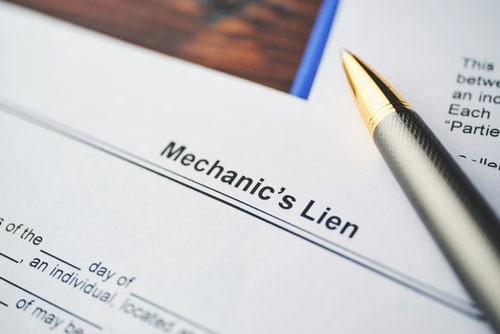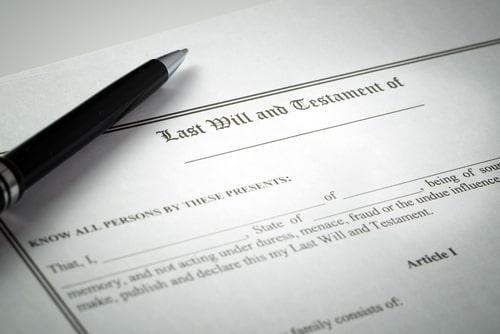Recent Blog Posts
How Can a Mechanic’s Lien Affect a Residential Real Estate Transaction?
 There are many different legal and financial issues that may play a role in a residential real estate transaction. Before a home can be sold, any encumbrances against the property must be cleared. In many cases, these encumbrances take the form of liens or debts that the current property owner owes to another party. Mechanic’s liens are one type of encumbrance that many people may not be aware of, and by understanding these types of liens, property owners can be sure they are prepared to address them properly and avoid any issues that may affect their ability to sell their home.
There are many different legal and financial issues that may play a role in a residential real estate transaction. Before a home can be sold, any encumbrances against the property must be cleared. In many cases, these encumbrances take the form of liens or debts that the current property owner owes to another party. Mechanic’s liens are one type of encumbrance that many people may not be aware of, and by understanding these types of liens, property owners can be sure they are prepared to address them properly and avoid any issues that may affect their ability to sell their home.
What Is a Mechanic’s Lien?
When work is performed on a home or property, a contractor has the right to seek repayment for this work. If a homeowner or property owner does not fully pay for work, the contractor may place a mechanic’s lien on the property to recover what is owed. Subcontractors or suppliers may also use mechanic’s liens to recover money that was not paid to them by a general contractor, meaning that in some cases, homeowners may be responsible for paying these amounts, even if they paid their contractor in full.
What Are the Benefits of Establishing Paternity for a Child?
 There are a variety of situations where parents may become involved in child custody disputes. When married parents get divorced, there is usually no question as to the identity of a child’s parents. However, when parents are unmarried, the child’s presumed father may not necessarily have legal parental rights toward the child. Matters involving child custody may become more complicated in these situations, and to ensure that parents’ and children’s rights will be protected, it may be necessary to establish paternity.
There are a variety of situations where parents may become involved in child custody disputes. When married parents get divorced, there is usually no question as to the identity of a child’s parents. However, when parents are unmarried, the child’s presumed father may not necessarily have legal parental rights toward the child. Matters involving child custody may become more complicated in these situations, and to ensure that parents’ and children’s rights will be protected, it may be necessary to establish paternity.
When Will Paternity Need to Be Established?
If a mother was married at the time of her child’s birth, or if she was in a marriage that ended within 300 days before the child was born, her spouse or former spouse is presumed to be the child’s legal parent. However, if a mother is unmarried when a child is born, the other biological parent will not be considered the child’s legal parent until paternity is established.
Understanding Covenants to Not Compete as an Employer
 Staying ahead of the competition is a critical factor in a company’s success. While some companies train their employees in unique and strategic manners, others have gained distinct intellectual property. When employees, especially those familiar with these unique properties, leave a company, the business may be subjected to subterfuge. To avoid risking this level of vulnerability, a company may require their employees to sign a covenant to not compete.
Staying ahead of the competition is a critical factor in a company’s success. While some companies train their employees in unique and strategic manners, others have gained distinct intellectual property. When employees, especially those familiar with these unique properties, leave a company, the business may be subjected to subterfuge. To avoid risking this level of vulnerability, a company may require their employees to sign a covenant to not compete.
Defining Covenants to Not Compete
Covenants to Not Compete, more commonly known as Non-Compete Agreements, act as a form of protection for businesses. The agreements prohibit employees from taking a job with a direct competitor within a given amount of time, thus, reducing the chances of the competitor learning of the business’s advantageous practices, including trade secrets and client lists.
It is not uncommon for non-compete agreements to accompany an employment contract. While requiring new employees to sign such agreements is fairly common in today’s competitive landscape, courts have the authority to invalidate the agreement and leave the employer vulnerable. Collaborating with a business law attorney can help companies ensure that their agreements are both enforceable and adequately protective.
What is Required of an Estate Executor in DuPage County?
 Many family members are burdened with the task of organizing and managing the estates of deceased loved ones. Creating a will ahead of time and communicating with those who will be administering the estate helps to prepare loved ones for their responsibilities. An important role of fulfilling an estate is the role of executor. Appointed executors should have a thorough understanding of what is expected of them and what challenges they may face.
Many family members are burdened with the task of organizing and managing the estates of deceased loved ones. Creating a will ahead of time and communicating with those who will be administering the estate helps to prepare loved ones for their responsibilities. An important role of fulfilling an estate is the role of executor. Appointed executors should have a thorough understanding of what is expected of them and what challenges they may face.
Appointing an Executor to an Estate
When a person dies, an executor is appointed to administer and direct the deceased’s last will and testament. Primarily, the executor is responsible for fulfilling the wishes of the deceased and managing necessary affairs. The will’s creator or the court will appoint an executor.
In Illinois, a court-supervised procedure, referred to as probate, may be required in the event of a death and typically is initiated by the executor. Through probate, numerous decisions are made on the behalf of the deceased, including decisions about inheritances and taxes.
What to Know About Illinois Foreclosures
ment. Once the specified grace period has passed, however, the homeowner may be subjected to a late fee. This late fee can then be accrued each month the loan goes unpaid. Lenders may also perform property inspections to determine if the home is still occupied and properly maintained.
What are a Homeowner’s Contractual Rights During Foreclosure?
Due to the documents signed when buying a residential property such as a promissory note and mortgage, rights and protections are also granted to the homeowner.
An Illinois homeowner facing foreclosure will likely have the right to receive a preforeclosure notice. This notice is referred to as a “breach letter”. The letter notifies the homeowner that their loan has defaulted and allows the homeowner time to correct this before a lender can move forward with the foreclosure.
Other rights that homeowners are typically guaranteed include:
-
The right to apply for loss mitigation
How Can I Obtain Retroactive Child Support in Illinois?
 Individuals who were never married but share a child often face unique challenges and circumstances. Challenges such as child support are often dealt with as an element of the divorce process. In cases that involve non-married parents, it is likely that the establishment of paternity will be required. If this step is delayed, it may be possible for the custodial parent to seek retroactive child support for the expenses incurred prior to the custody support order taking effect.
Individuals who were never married but share a child often face unique challenges and circumstances. Challenges such as child support are often dealt with as an element of the divorce process. In cases that involve non-married parents, it is likely that the establishment of paternity will be required. If this step is delayed, it may be possible for the custodial parent to seek retroactive child support for the expenses incurred prior to the custody support order taking effect.
The Parentage Act
Before child support or parenting time can be court-ordered, parentage must be determined. Parentage refers to the legal relationship between a parent and child. The Parentage Act in Illinois, originally established in 1984, entitles every child the right to their parents’ support, including physical, emotional, and financial support. The Parentage Act was specifically put in place to address the legal rights and responsibilities of unmarried parents. This includes divorced parents and parents who were never married.
Considerations to Make Before Buying an Existing Business in Illinois
 Buying a business can be an important milestone in someone’s career and personal life. In some cases, buying a company that is already established can be very appealing and make the owning process much smoother compared to starting a business from the ground up. However, before a potential buyer makes any major decisions, there are many business and personal aspects that they should take into consideration.
Buying a business can be an important milestone in someone’s career and personal life. In some cases, buying a company that is already established can be very appealing and make the owning process much smoother compared to starting a business from the ground up. However, before a potential buyer makes any major decisions, there are many business and personal aspects that they should take into consideration.
Reasons for Wanting to Buy a Business
There are many reasons people opt to buy an already existing business instead of starting a business from scratch. Avoiding the challenging startup period can provide pre-established benefits including the company brand and identity, building or office space, customer base, vendor and supply base, and management processes.
While buying an existing business poses several advantages, a potential purchaser should also consider why they want to buy a particular business. When buying a business, it is in the purchaser’s best interest to seek out a business that aligns with their interests and ambitions. Generally, a company will likely be more successful and innovative if the owner has more familiarity and knowledge of the business’s products, services, target market, and trends.
How Can a Living Will Help Plan for Future Medical Decisions?
 If there comes a time when you are unable to speak or make decisions for yourself, you will want directives in place that included pre-established decisions. A living will is a document that establishes a person’s medical care preferences should they be unable to communicate their desires. Living wills are one of many estate planning tools that an adult of any age can start preparing. With the guidance of a well-equipped attorney, living wills can be adequately formed and adjusted.
If there comes a time when you are unable to speak or make decisions for yourself, you will want directives in place that included pre-established decisions. A living will is a document that establishes a person’s medical care preferences should they be unable to communicate their desires. Living wills are one of many estate planning tools that an adult of any age can start preparing. With the guidance of a well-equipped attorney, living wills can be adequately formed and adjusted.
Purpose of a Living Will
A living will allows a person to still obtain the preferred medical treatment and prevents unnecessary hardship on an individual and their loved ones. Living wills allow a person to have their preferences met in a time they can no longer speak for themselves and also relieves their loved ones of the decision-making burden.
The durable power of attorney is a major component of an effective living will. This allows an individual to delegate another person to oversee that their wishes are met in terms of healthcare. The extent of authority that this agent is granted is at the discretion of the living will’s creator. If comprehensive authority is granted, the patient advocate will likely be permitted to consent or refuse consent to any treatment that affects physical or mental health, hire or fire any medical personnel, make choices regarding the best medical facilities for the patient, and more.
Can Illinois Homeowners Sue If Contractor Negligence Leads to Construction Defects?
 Homeowners generally take a great deal of pride in their property and residence. When the new home enjoyment is diminished by construction defects that lessen the functionality and value of the real estate, it may be challenging for homeowners to know what steps to take next. To accurately establish who is responsible for these flaws and effectively repair the home, it may be in the homeowner’s best interest to solicit the help of a real estate attorney who can help.
Homeowners generally take a great deal of pride in their property and residence. When the new home enjoyment is diminished by construction defects that lessen the functionality and value of the real estate, it may be challenging for homeowners to know what steps to take next. To accurately establish who is responsible for these flaws and effectively repair the home, it may be in the homeowner’s best interest to solicit the help of a real estate attorney who can help.
Categorizing Construction Defects
Defects that occur during the construction process can range from minor faults that are barely noticeable to extensive issues that could lead to substantial expenses for the homeowner.
Each phase of the construction project allows for the possibility of defects. When the land is initially acquired, oversights can lead to an inaccurate analysis of soil and environmental issues. Flaws in the design phase can result in structural deficiencies and project delays due to necessary modifications. Negligence on the part of a contractor or subcontractor often leads to the use of lower quality materials and contributes to an overall lower caliber of product for the customer. Issues including electrical, piping, or heating defects can contribute to water seepage, mold, and electrical failures. Flaws in a home’s foundation, including cracks in the walls, roof, or floor may also lead to a construction defect case. Alternatively, in cases that do not involve residences or buildings, defect claims may arise from roadway repairs, design, and construction.
The Purpose of Guardian Ad Litems in Child-Involved Cases
 During a case regarding child custody, a child may be appointed a guardian ad litem (GAL). GALs are court-appointed volunteer attorneys with legal or specially trained medical health experience. While some judges assign GALs to every case involving a child, other judges reserve this resource until requested by one of the involved parties. Certain circumstances that may benefit from a GAL include child custody, adoptions, child support, and the emancipation of a minor.
During a case regarding child custody, a child may be appointed a guardian ad litem (GAL). GALs are court-appointed volunteer attorneys with legal or specially trained medical health experience. While some judges assign GALs to every case involving a child, other judges reserve this resource until requested by one of the involved parties. Certain circumstances that may benefit from a GAL include child custody, adoptions, child support, and the emancipation of a minor.
The main goal of GALs is to represent a minor’s best interests. The best interest of the child is the standard that must be used by both the GAL and the courts to make decisions regarding the child’s future living arrangements and parent relationships. This standard includes elements such as the child’s age, current relationship with their parents, and the stability of each parent’s living arrangements.

 630-665-2500
630-665-2500







